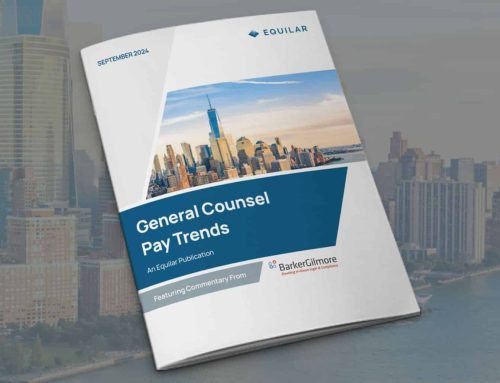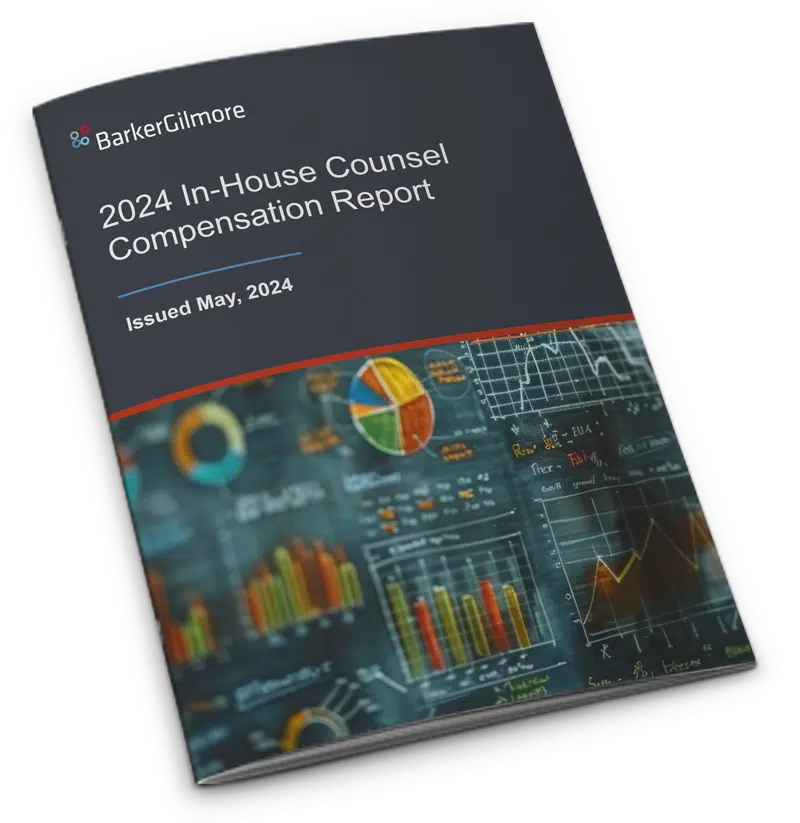BarkerGilmore releases its annual compensation reports to help in-house and compliance professionals understand the compensation trends and opportunities across various industries and roles. The data provides a benchmark for comparing total compensation, whether hiring, planning a move, or ensuring equity across a legal team.
In the GC AdvantageSM webinar, “The Top Need-to-Know In-House Compensation Trends,” John Gilmore, Managing Partner of BarkerGilmore, and Mary Rombaut joined me to provide insight into BarkerGilmore’s series of compensation reports.
Use BarkerGilmore’s 2023 Compensation Reports as a Benchmark
BarkerGilmore creates compensation reports to help in-house counsel and compliance staff understand how their compensation compares to peers. The reports can be used to benchmark where the in-house counsel stands within an industry or company type.
BarkerGilmore offers five total compensation reports:
- In-House Counsel Compensation Report
- Compliance Compensation Report
- Private Equity and Portfolio Company In-House Counsel Compensation Report
- Healthcare and Life Sciences In-House and Compliance Compensation Report
- General Counsel Pay Trends
How the Data is Collected and Analyzed
Each March, BarkerGilmore sends out a survey to a random sample of in-house and compliance talent and receives, on average, over 3,000 responses, which are then collated and analyzed to create the compensation reports. Medians are used to eliminate outliers from the reports. Then, the data is grouped based on company size, type, industry, and location. The reports also separate compensation by base, bonus, and long-term incentives, such as stock options, performance shares, and restricted cash.
Limitations on the Use of Compensation Reports
BarkerGilmore has found personal factors account for the most variation. These individualized factors include the years of experience, the law school the attorney attended, the type of law firm experience, and, for compliance professionals, whether they have a Juris Doctor. Thus, the reports cannot present every variation because companies consider many factors in compensation decisions.
Mary also noted that long-term incentives depend on the company’s performance, so the value reported could be higher or lower depending on how the company performs and when an individual leaves the job.
Compensation Trends
- General Counsel Recruiting. At the end of 2022, John predicted that the General Counsel marketplace would be booming, and BarkerGilmore is thrilled with the opportunities they have seen for General Counsel this year. The firm has completed more General Counsel searches than ever before. The reasons for the searches vary but include:
-
- General Counsel retiring or choosing to step aside to take mission-driven roles.
- Companies seeking a General Counsel who can keep up with the growth and strategy of the company.
- New CEOs looking for new talent after being onboarded.
On the Fortune 500 side, more experience eclipses less experience. Companies are looking for someone who is board-tested and not simply board-ready. Ideal candidates can already balance the CEO-board dual reporting structure.
- Looking beyond base and bonus. When moving positions, the focus must be on the long-term, not just the pay increase. Long-term incentives can be extremely lucrative. Candidates should research organizations and remember that big money comes on the back end.
- Handling a Move with Unvested Equity. When considering a move with unvested equity or an unpaid bonus, it is advisable to keep documentation of what is being left behind. The value a candidate brings is what makes the company excited about the individual joining the team. Typically, a new company will offer an equity component over time to replace the equity left behind.
- Public Versus Private Companies. The long-term incentive is the big difference in a compensation discussion with a public company versus a private equity portfolio company or a private company. With private equity, employees may get a lump sum of equity from the start. Whenever a transaction occurs in the future, the employee will get a payout. In a public company, there is little room for negotiation. Each member of the executive leadership team receives a set annual incentive award.
Considerations When Negotiating Compensation
People who are happy within an organization may want to ask for a pay increase. Here are some tips on what to consider before asking, whom to ask, and when to ask:
- Understand the compensation programs inside the organization. Total compensation has several elements: base, bonus, equity, and benefits or other perquisites. Learn where the company may have some discretion on those items.
- Understand total compensation. Some compensation is deferred. Understand how the equity award is valued and how much cash is a part of the base and yearly bonus.
- Understand the market and compare compensation. Using compensation reports, determine if a company pays well relative to peers in the industry or location.
- Analyze the entity’s current status. Is the organization fiscally strong or growing? Or is the company fiscally constrained or struggling a bit? Changes in the industry or the company can also make it a tough time to ask for a raise.
- Consider the timing for the raise. Many companies use an annual or biannual process for giving raises. Getting approval may be more difficult when making a request off-cycle. However, doing so may prime leadership for when the cycle comes again.
- Contemplate the rationale for the ask. If an employee has taken on additional work, has been heroic recently, or is paid less than peers internally or externally, this information could be used to justify the request. Additionally, focus on reputation: how do others discuss the value the employee brings to the organization?
- Decide who to ask. A manager is always a good first person to approach with the request. The manager should advocate on an employee’s behalf, especially if the manager must consult with other individuals in the company.
- Prepare for the response. What will the employee feel, or how will it affect the individual if the answer is a no? Will a “no” affect motivation, desire to stay, or sense of value or contribution?
For Managers: Be Proactive and Prioritize People When Handling Requests for Raises
Similar to the employee’s preparation for asking for a raise, leaders can prepare for how to respond to an employee’s request for an increase:
- Know the compensation programs available at the organization. Knowing where the company has discretion relative to bonus payouts and equity awards is crucial as a supervisor.
- Stay abreast of the market. As a manager, the BarkerGilmore compensation reports are a helpful way to know the market. Use data from the reports to advocate for more resources or be confident in the team’s current position.
- Prioritize people and compensation. Part of the job as a supervisor is to think about people and their pay. Ensure that there is equity among team members and reward people who have taken on more responsibility.
- Be proactive about handling compensation questions. If the supervisor is able to surprise team members with raises before they ask or expect it, this can be beneficial to the team members. Being proactive can also help minimize decreases by getting in front of them before the company forces some cuts.
- Know supervisors must make tough decisions. Everybody cannot get paid the same. Recognize the best team members and allocate resources toward them.
- Have perspective on the request. Is the company compensating the person fairly and adequately? Does the person deserve a bump? If it’s possible to advocate to leadership, do so.
- Be honest and transparent with employees when the answer may be no. Explain to the employee why they are not worthy of the raise. Do not blame the leadership for the response or tease the person into believing the raise will happen when it will not.
To benchmark your organization’s compensation and learn more about pay trends within the in-house legal and compliance community, access BarkerGilmore’s library of compensation research.
David Yawman and our team of professionals are happy to help accelerate the initiatives that you’re already pursuing or to supplement your current strategic thinking to help you realize your vision. Please reach out if you or your organization may benefit from our recruiting, leadership development and coaching, or legal and compliance department consulting services. Let BarkerGilmore help you build and optimize your legal and compliance departments.
Connect with a legal recruiting advisor
* indicates required fields







